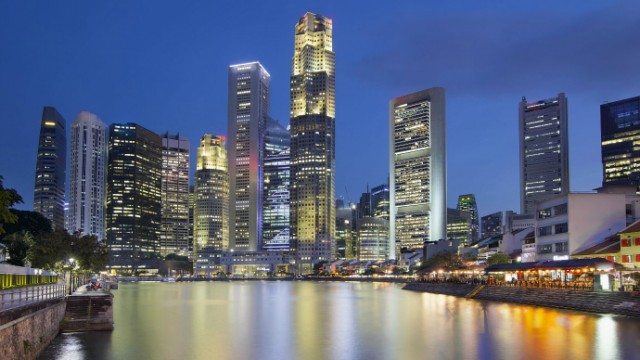Plug and Play recently debuted in Indonesia and partnered with Mercedes-Benz to launch an automotive industry-focussed accelerator programme
Silicon Valley-based startup accelerator Plug and Play is renowned for having an eagle-eye for promising companies, having made investments in big name players such as Dropbox, PayPal, LendingClub, and Soundhound during their infancies.
But as the ecosystem in Southeast Asia began to come into itself, the accelerator turned its gaze toward the region as a new nest of opportunity — Singapore specifically.
“Singapore has a fairly advanced ecosystem as it comes to financing, regulatory and legal frameworks, general startup environment and ecosystem,” said Jupe Tan, VP of Plug and Play’s International Operations, in an email correspondence with e27.
Plug and Play’s first venture in Southeast Asia was in 2015, where it partnered with Singapore’s main newspaper company SPH to launch an accelerator programme. The partnership was taken after a similar initiative it launched in Berlin called Axel Springer Plug and Play.
“Axel Springer used to be a traditional publisher, but has been on a journey to transform its business to digital over the last one to two decades. Axel Spring Plug and Play is just a small part of Axel Springer’s overall digital/startup/investment strategy. SPH Plug and Play is similarly just part of SPH’s overall digital/startup strategy,” said Tan.
SPH PnP’s first batch attracted over 300 applicants. A little more than a year later, however, Tech in Asia reported that the partnership was dissolved after it was placed “under review” for a few months.
Despite this outcome, Tan deemed the initiative a success and explained that the programme had simply run its course.
Also Read: Apple opens App Accelerator in Bangalore; to start assembling iPhones in India in a month
He said that SPH Plug and Play had managed to graduate two batches of eight startups each, with 11 of them raising over S$8 million (US$5.7 million) on aggregate in additional funding, with a combined portfolio valuation of around S$40 million (US$28.6 million).
Tan said he could not comment specifically for SPH but both parties were, in general, satisfied with how the programme was managed.
The decision not to run a third batch was because both parties had evolved in their respective strategies when it came to early-stage investments in Singapore and the region.
“By the time we were running Batch 2, the market had evolved to see many more early-stage accelerators in Singapore and I personally believe the ‘supply’ of startups was not catching up to the ‘demand’ for early-stage capital,” he said.
Singapore and beyond
With the conclusion of its first venture, Tan said that Plug and Play’s bullishness on opportunities within Southeast Asia has not changed. In fact, this year, Plug and Play is ramping up its presence in the region.
In Singapore, it launched an automotive industry-focussed programme in partnership with Daimler and Mercedes Benz called Startup Autobahn Singapore (SAS). The first version of Startup Autobahn was launched in Germany with a focus on automotive tech such as sensors and telematics.
But for the Singapore market, Tan said that SAS’ focus will be broader, focussing less on the car itself but on peripheral services within the automotive market such as customer experiences.
Last week, SAS unveiled its first batch of six startups. While some — such as Dre Valet, an on-demand valet service, and Fixir, a car workshop marketplace — are, directly related to automotive, others are industry-agnostic. These includes AI assistant Surge and Rendezvous, a video-conferencing platform embedded with other communication tools.
Also Read: A sneak-peek at the 4 startups graduating from Myanmar’s Phandeeyar Accelerator
Besides automotive experiences, Plug and Play also partnered with TNB Ventures to launch Sensing Cities, a programme designed to accelerate Singapore’s Smart Nation ambitions by supporting IoT, AI, and AR/VR startups.
But beyond Singapore, Tan said Plug and Play will expand the scope of its activities to larger markets in the region, as well as to support “multiple customised and bespoke programmes” out of its Singapore office. Its next major regional focus this year is Indonesia.
“We are very excited. The ecosystem is growing rapidly, and we have seen initial wave of startups like Tokopedia and Go-Jek growing rapidly and achieving success and that is trickling down and encouraging more entrepreneurs to start companies,” said Tan.
“There is good public and private sector support as well, from President Jokowi’s vision of growing 1,000 digital startups by 2020 to various corporations investing and working with startups.”
He also cited the expanding middle class and penetration of low cost and more powerful smartphones, which will give rise to disruptive startups in the country.
This led to the establishment of Plug and Play Indonesia, an accelerator that focusses on mobile and fintech services. For this venture, it partnered with major Indonesian banks such as BNI, Bank BTN, as well as conglomerates, including Astra International.
A sizeable portion of Indonesians — about 36 per cent according to a World Bank 2014 Global Findex database — are unbanked, but with the proliferation of affordable smartphones, this represents an opportunity for startups to introduce financial services such as p2p transfers and cross-border remittances in the country, said Tan.
That said, Plug and Play Indonesia will have more hurdles to cross than its Singapore counterpart.
Also Read: MaGIC launches new global accelerator programme, looking to bring in 80 global entrepreneurs
“Singaporean banks are fairly sophisticated with tokens, 2FA, mobile-banking, and have large IT teams, but that is not necessarily the case for other financial services in the region (emerging markets),” said Tan.
Plug and Play Indonesia’s startups will have to learn how to deploy newer technology while keeping the cost low.
—-
Want to be part of the ecosystem?
Register for your Echelon Asia Summit access pass now! Enjoy +10% off Echelon Asia Summit Startup, Investor and Corporate passes just for being our favourite e27 reader.
The post How US-based accelerator Plug and Play is tackling the Southeast Asia ecosystem through partnerships appeared first on e27.
